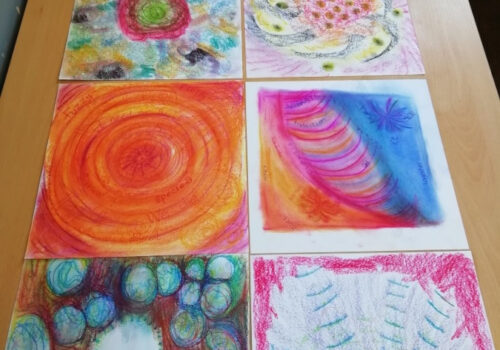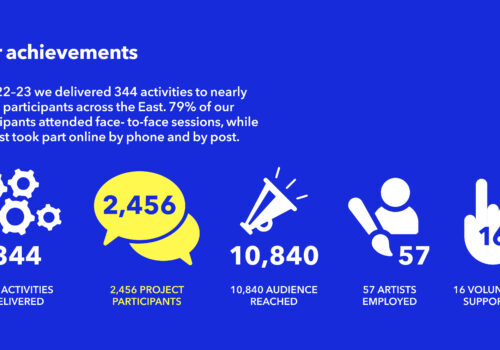“Finally moving forward!”
A Participant’s Personal Story
“My life used to be really busy until my depression. I now get up and then have a smoke and get ready to go out. On Tuesdays and Thursdays, I go to Curious Minds, and this is something that I didn’t used to do.
Before I did Curious Minds, I didn’t do much and some days I didn’t even get dressed as I had no need to get up. I don’t go out anywhere. I used to sit and watch TV most of the time. Now, every day I get washed and dressed. I eat once a day, in the evening and this is due to me being really fed up and can’t be bothered to cook just for one. I used to batch cook much of my food but when I’m fed up I no longer do this.
I have now made friends, I never used to have many friends. I now have met x from Curious Minds and we now go for coffee. This has been such a big change for me. It has also inspired me to get in touch with my old friends. I have now started to make plans!
Before I was quite happy to stay inside and not do anything, but I have now signed up for more courses. I have signed up for a networking breakfast, which is a really big step for me! I would never have done this before! I am now doing another Curious Minds course and have signed up for the next course, too.
I never used to have many friends and now I do thanks to Curious Minds. I look forward to things now and feel so much better!
Coming together as a group of likeminded people, talking to other people, having a purpose each week helped to create the change.
I am now looking forward to things, I used to feel I didn’t have any real purpose but now I look forward to coming out, meeting the group, doing the art, and talking to people. I am so much better than I have been. I am beginning to get better!
The changes have been so significant in helping me to move forward.”
The social impact value for 29 people who took part in our evaluation was £175,107. An average value of £6,038.
About Curious Minds
Suffolk Artlink’s Curious Minds is a mental health wellbeing project, delivered in partnership with Suffolk Libraries and the Ipswich and East Suffolk Alliance. Its purpose is to support the Primary Care Personalised Care Programme and participation is by referral through Ipswich and East Suffolk Primary Care.
The free programme supports people aged 18 or over in Ipswich and East Suffolk living with complex health needs who are diagnosed with two more long-term health conditions.
It is an arts and heritage programme designed to support wellbeing through creative and mindful activities. Curious Minds offers participants the chance to enjoy exploring a variety of art forms whilst developing creative skills and tools to support mental wellbeing.
Evaluation and Value
Suffolk Artlink is evaluating this programme using two methods, the Short Warwick Edinburgh Mental Wellbeing Scale and Most Significant Change.
The amazing personal story above was generously shared by a participant as part of our Most Significant Change qualitative evaluation and is representative of the amazing creative journeys these brave participants have taken through the programme.
Impact is also measured using SWEMBS, the short Warwick-Edinburgh Mental Wellbeing Scales. This is a validated and widely used tool for measuring wellbeing. Warwick Medical School. WEMWBS https://warwick.ac.uk/fac/sci/med/research/platform/wemwbs
“Well-being can be understood as how people feel and how they function, both on a personal and a social level, and how they evaluate their lives as a whole. To break this down, how people feel refers to emotions such as happiness or anxiety. How people function refers to things such as their sense of competence or their sense of being connected to those around them. How people evaluate their life as a whole is captured in their satisfaction with their lives, or how they rate their lives in comparison with the best possible life.
You can think of someone as having high well-being if they function well, have positive feelings day-to-day and overall and think their lives are going well; we call this ‘flourishing’. Similarly, you can think of someone as having low well-being if they do not function well and have negative feelings day-to-day and overall.”
Measuring Well-being A guide for practitioners, Juliet Michaelson, Sorcha Mahony and Jonathan Schifferes.
Note
To calculate a financial value for social impact, we used the method detailed in the study: Mental health and life satisfaction: the relationship between the Warwick Edinburgh mental wellbeing scale and life satisfaction a pilot study, D Fujiwara, K Keohane, V Clayton, U Hotopp. https://hact.org.uk/wp-content/uploads/2021/11/MentalHealth_and_LifeSatisfaction_web.pdf

